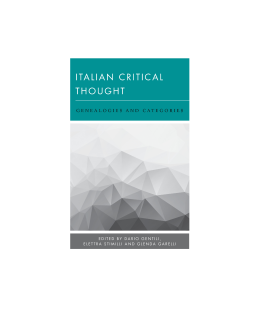
Additional Information
Book Details
Abstract
Italian philosophical and political thought has been receiving ever-growing attention in international debates. This has mainly been driven by the revival of the Italian neo- and post-Marxist tradition and of the Italian interpretation of French Theory, in particular of Foucault’s biopolitics. So, is it now possible to speak of an ‘Italian Theory’ or an ‘Italian difference’ in the context of philosophical and political thought?
This book collects together leading names in Italian critical thought to examine the significant contributions that they are giving to contemporary political debates. The first part of the book draws a possible genealogy of the so-called ‘Italian Theory’, questioning the possibility of grouping together many authors, and political and theoretical approaches which are often reciprocally in conflict. The second part of the book presents certain categories that have become characteristic of Italian Thought for their original interpretation and use by some of the authors recognized as part of the Italian Theory tradition, from biopolitics and political theology to crisis and immanence.
Dario Gentili is Associate Professor of Moral Philosophy, in Department of Philosophy, Communication and Performing Arts, University of Roma Tre.
Elettra Stimilli is Assistant Professor in the Department of Philosophy at the Sapienza University of Roma.
Glenda Garelli is Lecturer in Human Geography at the University of Leeds.
What exactly is Italian thought and how might it help us respond to some of the political and ethical predicaments we face today? In this virtuous collection, Gentili, Stimilli and Garelli have arranged a number of incisive pieces that do justice to the broad and ecumenical perspectives that make up contemporary Italian thought. From autonomia to biopolitics to political theology and its critique, the snapshot that emerges of Italian thought is one of a powerful ontology and immanence able to enhance difference in a political moment that sorely needs it. It also happens to be a wonderful introduction for those new to Italian philosophy.
Timothy C. Campbell, Professor in the Department of Romance Studies, Cornell University
Italian Critical Thought demonstrates that there are theoretical and political alternatives to the grand narratives of neoliberalism; that the vocabulary of globalization, free market, competition, and crisis can be displaced by critical imagination and militant philosophy. This volume provides a necessary toolbox for naming the excess of politics and mobilizing what resists against, or escapes from, the horizon of the nation-state and its categories.
Federico Luisetti, Professor of Italian Studies, University of St. Gallen
Table of Contents
| Section Title | Page | Action | Price |
|---|---|---|---|
| Contents | 7 | ||
| Acknowledgements | 9 | ||
| Introduction | 11 | ||
| I: Genealogies | 19 | ||
| 1 German Philosophy, French Theory, Italian Thought | 21 | ||
| 2 Post-Operaism? No, Operaism | 33 | ||
| 3 Italian Theory? Elements for a Genealogy | 43 | ||
| 4 Italian Theory and Its Differences | 57 | ||
| 5 Old Courses in New Countries | 69 | ||
| II: Categories | 81 | ||
| 6 A World to Gain | 83 | ||
| 7 Politics and Philosophy in Italian Radical Thought | 91 | ||
| 8 The Crisis Dispositive | 109 | ||
| 9 Inhabiting Immanence | 123 | ||
| Selected Bibliography | 139 | ||
| Index | 141 |
